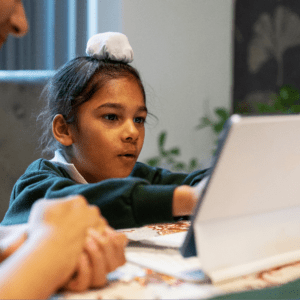One of the first things that I remember learning in my teaching degree is that most teachers throw out most of what they learn at university. Many universities put a great deal of effort into building quality, evidence-based programs that include the latest educational research, but then it gets thrown out the window as soon as their students graduate and enter the classroom.

In many cases, teachers tend to default to how they were taught.1 Many teachers decide to enter the profession because they were inspired by their own teachers, so they try to replicate this for their students. This does result in some bad practice being carried down through generations of teachers.
But why does actual research get pushed down the list of priorities? And what can schools do about it?
Why do teachers ignore research?
- They don’t know how to read and interpret it.
- They don’t have the time.
- They don’t understand the importance of it.
- They aren’t supported in implementing it.
What can schools do to support teachers to implement educational research?
- Give time to research and plan.
- Implement a whole-school approach to evidence-informed practice.
- Acknowledge action research and build rigorous research and implementation.
Why do teachers ignore research?
They don’t know how to read and interpret it.
Depending on what university you went to and how you were taught to teach, this can be a real problem. Many teacher education programs do not value critical analysis and interpretation of data and formal research to the degree that other areas do.
I was lucky enough to do a dissertation as a part of my degree. It was 15 000 words worth of literature review and my own analysis of data from an actual school in my area. It taught me the basics of data analysis (that I had not needed to use to this degree before) and got me used to finding and using educational research. Many of the people who I went through this course with complained, saying that an extra placement would be more beneficial.
What you are left with is teachers who don’t have a lot of experience in reading peer-reviewed articles. This can make it feel like educational research is a real chore because it is. It takes a great deal of time and effort for many teachers to wade through educational theory, and as we all know…
They don’t have the time.
You come home from school after an exhausting day and collapse on the couch. After a quick nap to recover, you open up your laptop to keep working. What are you going to do: read some papers on educational research, or plan your lessons for the next day so that you can actually teach and support your students?

Many teachers simply do not have the time in the day to be going through research papers to improve their practice. Time isn’t given in their working day to go to the bathroom in many instances yet along slog through academic papers.
If you ask teachers to do this without giving the time in the workday for them to do it, they will be up even later than they already are trying to keep on top of their work as well as their personal life. This coupled with a lack of awareness around the importance of research means that it falls behind for many teachers.
They don’t understand the importance of it.
Don’t get me wrong, most teachers are constantly improving their practice. They are always paying attention to how their lessons and actions impact their students and reflecting on it to improve next time. For many teachers, this is enough.
When they simply don’t have enough time to put into researching and overhauling their teaching programs and practice, this reflective practice is seen as enough. Many teachers would agree that it would be nice to get more formal research into their teaching, but what they are doing is good enough.
It is important to get an outside perspective and consider something brand new, though. Many times I have observed a teacher’s lesson because they were struggling with a class to find that what they were trying to do were just variations on the same idea. They had not considered a completely new way of doing things. Sometimes we need a bit of a shake-up and a little perspective.
They aren’t supported in implementing it.
Many of the policies and procedures in schools limit the new things that teachers can try. I’ve had difficulties in the past when I’ve tried to completely change my mode of teaching and met a blanket “well, we don’t do that here”.
It’s not just the schools that you need to convince either. Particularly in private schools, parents often have a great deal of influence over what goes on. They’re paying the fees, and they expect a certain standard. What that standard looks like often depends on what they are familiar with from when they went to school.

I was at a conference a few weeks ago and one of the speakers was sharing their experience with a really unusual approach to assessment. When discussing it with the other attendees, one of the teachers straight out said that it was great and looked like a lot of fun for the teacher and students, but she would never be allowed to do it. She worked at the most prestigious private school in the area, and trying something that was unfamiliar to the parents of her students would result in complaints and possibly her losing her job.
What can schools do to support teachers to implement educational research?
Give time to research and plan.
I went to visit a particular school that is well-known in the area for being an excellent school. They had a group of teachers who had opted-in to spending time each week meeting to read and discuss the latest educational research and discussing how they could implement it at their school. They were given two hours of release time to do this, and school leadership would always check in during the last ten minutes (and only the last ten minutes) to see what ideas they had.
This group had gone beyond their initial brief and had actually formed a strong relationship with the local university. Every other week, one of the professors from their School of Education would come down to actually discuss and explain what’s going on in educational research. These teachers were highly engaged in this process because they were given time to do it, expert support in understanding it, and school leadership were interested in their work without being overbearing and pushing their own ideas and agenda.
Implement a whole-school approach to evidence-informed practice.
This isn’t always possible, but many schools hold professional development days where educational research is discussed and summarised for all staff. They will then have time to go and plan how they are going to implement it. This is a fantastic start.

Teachers should be aware of what the research is, what the evidence suggests, how they can implement it and why they should implement it. This can be done by embedding it into the workings of the school. It is amazing how far simply insisting on using particular language when discussing teaching strategies in meetings can go towards shifting attitudes and embedding ideas in every classroom.
Acknowledge action research and build rigorous research and implementation.
There is often a huge disconnect between the people researching education and those actually teaching in classrooms. A lot of research is easily dismissed when you know that the person telling you what you should be doing hasn’t taught in a classroom for a decade.
Acknowledging the experience and expertise of teachers needs to be done before they are told to shift everything that they are doing based on the ideas of someone who they think doesn’t understand.
In a way, experience is a form of research.2
Many teachers do action research throughout their careers where they are constantly trying new things and reflecting on the impact that it has had. A lot of schools have formalised processes to structure and record this, and it would be a small step to do a little reading to try and explain why what teachers are trying is or isn’t working.
There are many reasons why teachers seem to ignore educational research.
Some lack understanding and skills, and most of them lack time. By embedding certain structures and procedures into the everyday approach at a school, teachers can feel supported to use evidence to try new things and improve their teaching.
What do you think about educational research? How have the schools that you’ve worked in supported you to incorporate it into your practice? Leave a comment below!
References:
1Cox, S. E. (2014). Perceptions and influences behind teaching practices: Do teachers teach as they were taught?. Brigham Young University.
2Oleson, A., & Hora, M. T. (2014). Teaching the way they were taught? Revisiting the sources of teaching knowledge and the role of prior experience in shaping faculty teaching practices. Higher education, 68(1), 29-45.





